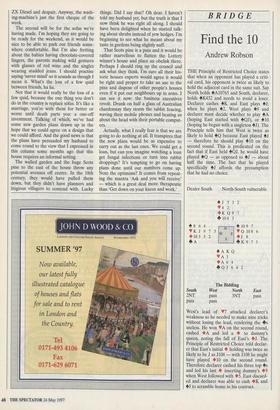BRIDGE
Find the 10
Andrew Robson
THE Principle of Restricted Choice states that when an opponent has played a criti- cal card, his opponent is twice as likely to hold the adjacent card in the same suit. Say North holds 4A10765 and South, declarer, holds 4K432 and needs to avoid a loser. Declarer cashes 4K and East plays 4.1; when he plays 42, West plays 49 and declarer must decide whether to play 4A (hoping East started with 4QJ), or 410 (hoping he begun with a singleton 4J). The Principle tells him that West is twice as likely to hold 4Q because East played 4J — therefore he should play 410 on the second round. This is predicated on the fact that if East held 4C2J, he would have played 4Q — as opposed to 4J — about half the time. The fact that he played specifically 41 affords the presumption that he had no choice.
Dealer South North-South vulnerable
The Bidding South West North East 2NT pass 3NT pass pass pass West's lead of V7 attacked declarer's weakness so he needed to make nine tricks without losing the lead, rendering the +s useless. He won VA on the second round, cashed •A and led a • to dummy's queen, noting the fall of East's •J. The Principle of Restricted Choice told declar- er that East's initial • holding was twice as likely to be J as J108 — with J108 he might have played •10 on the second round. Therefore declarer cashed his three top 4s and led his last • inserting dummy's •9 when West followed with •5. East discard- ed and declarer was able to cash •K and 41 to scramble home in his contract.


























































 Previous page
Previous page